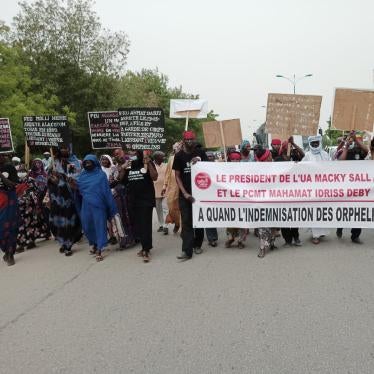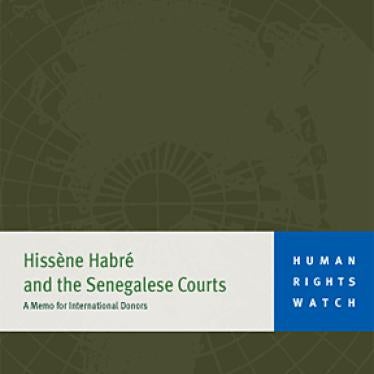(New York) - The African Union must call on Senegal to fulfill its legal commitments and ensure that the exiled former dictator of Chad, Hissène Habré, is brought to justice, Human Rights Watch said today.
An A.U. legal panel begins meeting today in Addis Ababa to study how the Habré case should be handled.
“The African Union experts must tell Senegal to extradite Hissène Habré or prosecute him,” said Reed Brody, special counsel at Human Rights Watch. “Sending Habré to Belgium is the most realistic option for ensuring a prompt and fair trial. But if Senegal won’t extradite him, it is obliged to see that he is tried in Senegal or elsewhere.”
Habré, who fled to Senegal in 1990 after an eight-year rule marked by widespread atrocities, was first indicted in 2000 in Senegal. After Senegalese courts ruled that he could not be tried there, Habré’s victims pursued justice by turning to Belgium, which indicted him last September.
In November, after a Senegalese court refused to rule on his extradition, the Senegalese government asked the African Union to decide the matter. The African Union appointed a committee of jurists to study the case and propose a solution to leaders meeting at the A.U. summit in July.
The 1984 U.N. Convention against Torture, which Senegal ratified in 1986, obliges states to either prosecute or extradite alleged torturers who enter its territory. Last week, the United Nations Committee against Torture condemned Senegal for failing to bring Habré to justice and requested that Senegal ensure Habré’s trial or extradition.
In a 29-page submission to the African Union, Human Rights Watch said that Habré’s extradition to Belgium or his trial by Senegal represented the only viable paths to justice.
The African Union has refused to reveal the names of the committee of jurists or to allow Habré’s victims or their supporters to meet with the committee.
The Belgian government has said that if Senegal refuses to extradite Habré, Belgium will invoke article 30 of the Convention against Torture, which could lead it to take Senegal before the International Court of Justice. A decision by the international court would be legally binding on Senegal.
In March, the European Parliament also called on Senegal to bring Habré to trial or extradite him to Belgium.
The Human Rights Watch submission concludes that Habré’s extradition to Belgium represents the most feasible and promising option for his trial. The creation of a new African tribunal would be too distant, too contingent and too costly, Human Rights Watch said. The study also ruled out Habré’s return to Chad because of the risks to Habré’s own security and the difficulties of ensuring that he would receive a fair trial. Senegal has already said that it will not try the case. If the African Union recommends that Habré’s trial take place in Africa, it should call on Senegal to reverse itself and allow Habré to stand trial there, Human Rights Watch said.
Background
Hissène Habré ruled Chad from 1982 until 1990, when he was deposed by current President Idriss Déby Itno and fled to Senegal. His one-party regime was marked by widespread atrocities. Habré periodically targeted various ethnic groups, killing and arresting group members en masse when he believed that their leaders posed a threat to his regime. Files of Habré’s political police, the DDS (Direction de la Documentation et de la Sécurité), discovered by Human Rights Watch in 2001, reveal the names of 1,208 persons who died in detention. A total of 12,321 victims of different abuses were mentioned. In these files alone, Habré received 1,265 direct communications from the DDS about the status of 898 detainees.
Last September, a Belgian judge issued an international arrest warrant charging Habré with crimes against humanity, war crimes, and torture. Pursuant to the arrest warrant and a Belgian extradition request, Senegalese authorities arrested Habré on November 15. After a Senegalese court refused to rule on the extradition request, Senegal announced that it had asked the January summit of the African Union to recommend “the competent jurisdiction” for the trial of Habré. That summit set up a Committee of Eminent African Jurists to consider the options for Habré’s trial and to report back at the forthcoming A.U. summit in July.







